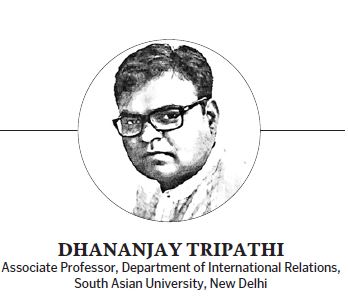India’s competition in the region is with China and any public outrage against a South Asian country will only further help pro-Beijing groups
Published Date – 16 January 2024, 11:45 PM

By Dhananjay Tripathi
In the last few decades, if something has started defining our lives, it is social media. Before the Arab Spring, there was a belief that social media was primarily for personal and social connection. It has nothing to do with politics. The Arab Spring changed that perception, and thereafter, we know how social media remained in the news for different reasons, including manufacturing consent, driving consumption, and even misleading public opinion.
Recently, we witnessed a similar situation between two South Asian neighbours where social media posts almost triggered a diplomatic crisis between India and Maldives. It all started after Prime Minister Narendra Modi shared a few scenic pictures of the Lakshadweep. The Prime Minister praised the natural attractions of Lakshadweep, and it soon went viral. The post of Indian PM was normal and cheerful, but a few Maldivian politicians occupying ministerial positions in the present establishment jumped into the debate and posted offensive comments. In this unprecedented situation, Maldivian ministers used derogatory language on social media. Though they deleted their tweets and were suspended, the damage was done.
Social media is a place that gives space for instant communication/reactions. Indian celebrities and the general public responded angrily, and we soon witnessed hashtags like ‘BoycottMaldives’ trending on X. The anger of Indians is quite discernible, given outrageous comments from Maldivian leaders. Nonetheless, a call for a boycott was an extreme reaction.
Boycott Calls How Mature?
There is no comparison between India and the Maldives. In every respect, the former is a big country. While India is a land of 1.4 billion people, Maldivian citizens are just around five lakh. The Maldives is known for its pristine natural beauty and is one of the favourite tourist destinations. In this regard, its economy depends on tourism, and any call for a boycott is like an informal economic sanction against the country. Last year, almost 2 lakh Indians visited the island nation, making it the number one country for Maldivian tourism. In this high -middle-income state with nearly 98 per cent literacy, some 45,000 people are engaged in the tourism industry. According to the World Bank, almost one-third of the economy is related to tourism, and at present, there has been no sign of distress, particularly the recovery started in this sector after the Covid crisis.
Along with Indians, Russians, West Asians, Europeans and Chinese people keep visiting this island nation as tourists. The coming of Indians does matter for Maldives, but to believe that it will almost wipe out the earnings from the sector is more of an imagination. Moreover, there are several Indians employed in the service sector of the Maldives and some have invested in this industry. It will likely impact their profitability and employment.
What about Politics?
Politically, the Maldives, in the last few decades, has shown an interesting phenomenon. When the Indian social media space was full of anti-Maldives sentiment, Adam Azim of the Maldivian Democratic Party (MDP) won the election for mayor in Male. The MDP is a party of former Maldivian President Ibrahim Solih, considered close to New Delhi. The current President, Muizzu, was backed by pro-China political groups who project themselves as anti-India.
This kind of polarisation in the name of India is not new in the Maldives. One can see similar politics concerning India in other South Asian countries. With the rise of Chinese intervention in the region, it will only intensify. Let us not forget that China has formidable economic linkages with most of the South Asian countries and is now also making efforts to address border issues with Bhutan. Thus, the Indian competition in the region is with China, and this is well-known to the political parties of every South Asian country. To sum up, it is not a great situation from the Indian perspective, as any public outrage against a South Asian country will only further help pro-China groups.
Space to Diplomacy
It is good to see that people of the country are now taking an interest in foreign policy issues and are also vocal on things they regard as relevant to the national interest. However, national interest in international relations is complex and requires a nuanced understanding. A myopic view on national interest does not fit with the rising status of India in world politics.
Coming back to the India-Maldives relations, let us not lose our sleep because there is a regime which is pro-China. In all respects, India is a close neighbour of the Maldives and has massive investments in the country. Similarly, let us not expect Muizzu to change his political position so easily as there is an intense contest in his country, and his political rivals are pro-India. Muizzu had already made it clear that Indian forces, who are not more than 70 in number, should leave the country, and this is more for public consumption.
Moreover, China will not leave any stone unturned to maximise its benefit during the tenure of Muizzu but it is not an end of India’s role in the Maldives. Time to practise bilateral and regional diplomacy because whatever politics may happen in the neighbourhood, India remains the most critical player in the region. This is also to be realised by Muizzu, and he cannot afford to offend India for the larger interest of the Maldives. India and the Maldives need a long-term approach, and it is suitable for both countries.





